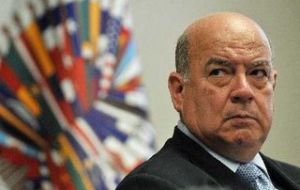MercoPress. South Atlantic News Agency
OAS Cuba’s sanctions could be lifted Tuesday in Honduras
 Insulza optimistic that a consensus can be reached, following OAS tradition
Insulza optimistic that a consensus can be reached, following OAS tradition The Organization of American States, OAS, secretary general Jose Miguel Insulza said he was optimistic that an agreement to lift the suspension on Cuba can be reached at the 39th general assembly which officially begins Tuesday in Honduras.
Insulza said he was an “impenitent optimist” and is betting on an agreement to put an end to sanctions on Cuba dating back to 1962 and the Cold War, an issue which has divided OAS 34 member countries and in spite of last minute negotiations to reach a consensus before the meeting, remains elusive.
A task force decided by OAS members to try and find a consensus “is still working” said Insulza who added that “obviously the issue will be brought up at the assembly”
But if no agreement is reached, a possible scenario would be a vote on the issue, but recalled Insulza “this hasn’t happened for quite some time”, since OAS always tries to work on a consensus.
“I think negotiations on a consensus will go on until the last minute, and if nothing happens then ministers will see how to advance, so there are still long hours of discussions” said Insulza who underlined that whatever decision is reached the Secretary General Office will be involved in so far it is responsible for its implementation.
But he’s duty is to put forward to the assembly the anachronism of the 1962 decision, taken when Cuba was accused of openly aligning with the Soviet Union and Beijing, almost half a century ago. “What is needed a policy of inclusion, not of exclusion”, he underlined.
US Secretary of State Hillary Clinton said two weeks ago that supporting a return of Cuba to OAS can only be carried out if Havana applies political reforms, basically democratic institutions and liberation of political prisoners.
However Nicaragua proposes bringing Cuba back immediately and unconditionally, saying that the 1962 expulsion was an “error and an act of injustice”. Honduras, Venezuela and Bolivia that are politically close to Cuba, also voiced support for Cuba's return as so has most of Latinamerica. However a few countries are concerned about democratic reforms in the island.
Analysts anticipated OAS members will take a vote on Cuba's readmission on Tuesday, and if 23 of the 34 members cast the “yes” vote, Cuba would be back in the century-old group again. Even when the Havana regime has repeatedly said that it had no desire to rejoin the OAS, which it ridicules as an instrument of Washington’s imperialist wishes and intentions.
Nevertheless US/Cuba relations are warming up since President Obama took office. Last week both countries agreed to resume talks on direct mail between the nations, a topic that has stagnated for decades, and migration, suspended in 2004 under president George W. Bush, who also limited money remittances to Cuba and family visits to one every three years.
In March, ahead of the Summit of the Americas in Trinidad and Tobago, Obama lifted Bush's 2004 restrictions, imposed as part of a so-called “Transition Plan towards a Free Cuba”.
Public opinion surveys indicate that 68% of US citizens believe that the country's policy towards Cuba should be changed, and it has been too long for the two countries going without any diplomatic links since 1961.




Top Comments
Disclaimer & comment rulesCommenting for this story is now closed.
If you have a Facebook account, become a fan and comment on our Facebook Page!